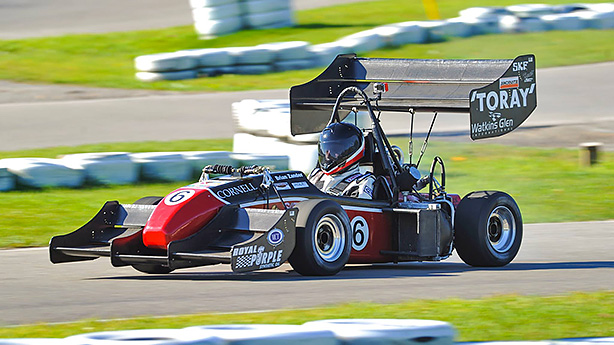
Cornell's 2014 Formula Society of Automotive Engineers (SAE) Team car, ARG14, in action during competition earlier this year in Michigan.
Engineering project teams exemplify alumni support
It smells like an auto repair shop in the lower floor of Upson Hall, a pungent combination of oil, gasoline, dust and cement. The Cornell Racing shop is empty of students for the summer, but it is evident that just a few months ago the two workstations -- one for the Formula Society of Automotive Engineers (SAE) car and the other for the Baja car -- were alive with activity.
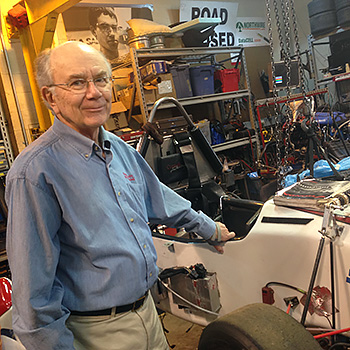
Professor Al George, longtime adviser to Cornell's Formula SAE team, in the Cornell Racing shop in Upson Hall.
Professor Al George, longtime adviser to Cornell's Formula SAE team, points out a student welding job on the 2014-15 Baja car, back in its spot after placing first, second and fourth in three North American Baja SAE events.
"This is way better than it needs to be," he says of the perfect metal seams in the car's suspension. Attention to detail is a sign of good engineers; some day soon, if the students who welded this car follow in the footsteps of many a Baja team member, they might be supervising projects as engineers with Google, Cummins, SpaceX or Moog, which seek out Cornell project team graduates.
A quarter of all undergraduate engineering students participate on a growing number of project teams -- 23 in 2014-15. Project team alumni say the real-life design, teamwork and hands-on experience they gained is instrumental in their professional work. And current project team students, staff and faculty say alumni engagement -- from advice to a vibrant network to financial support -- is essential to successful teams.
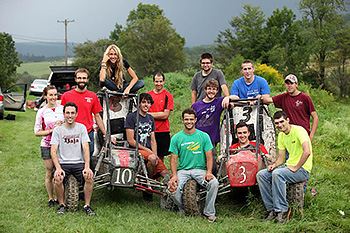
Alumni team members of Cornell's Baja SAE Racing Team at a reunion in 2013.
The last semester at Cornell for Tim Cook '14 was "just nuts," he says. Not only was he taking a full load of classes; he also was putting in 40 hours a week as a leader on the Formula SAE team. He remembers vividly the last day on campus before he and teammates traveled to compete in the Formula SAE Michigan Competition.
"We were up at 3 a.m., driving and troubleshooting," he says. They just fixed last-minute problems before packing the vehicle, which the 70-member team had worked on for a full year to design and build, in a trailer to drive to Michigan. The 2014 Cornell Racing car placed 44th overall in the 7-stage competition, which includes dynamic events such as an acceleration test and an endurance race, and static events such as a cost competition and a pitch to potential financers. FSAE competitions attract more than 500 teams from the United States, Germany, Brazil and other countries.
Now, Cook works as a test cell engineer for Achates Power, a company based in San Diego that is developing efficient opposed-piston engines.
"I use things I learned on SAE every single day, every hour," Cook says.
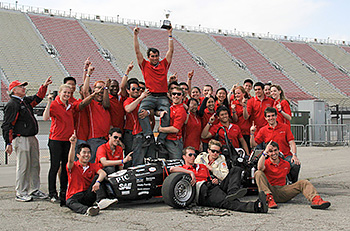
Cornell's 2013 FSAE team. The car, ARG13, placed 6th overall at the annual competition.
Microcosms of industry
A Formula SAE team is a microcosm of industry, says David Johnson '89, MBA '90, president and CEO of Achates Power. "I try to recruit project team graduates because I think it's a great training ground for exactly the kind of engineers we need."
They're also ready to solve problems creatively, says George, who helped students start the first Cornell Racing team in 1987. FSAE team members don't just go into engineering after graduation; the problem-solving skills they gained as team members have helped recent graduates succeed on Wall Street and in the nonprofit sector.
"Sometimes there isn't a right answer," says TeAnn Nguyen '15, who was a systems engineer for Cornell Racing in 2014-15, "and that kind of freedom for creativity is doubly satisfying when you find something that does work."
"It's also great to be able to say, 'Yeah, I build race cars.'"
Cornell Racing is the "granddaddy" of engineering project teams, says Rebecca Macdonald, the Swanson Director of Engineering Student Project Teams at Cornell, but there are many others students can choose from, including the Autonomous Underwater Vehicle team, the Cornell Mars Rover team, Engineering World Health -- which creates innovative medical devices -- and the Concrete Canoe team. All teams offer various levels of course credit.
"Different teams can serve different roles or reasons," says Macdonald. Her goal as director is to have a "portfolio of teams" with something to offer any interested student. About 25 percent of engineering undergraduates participate in a team, with mechanical engineers' rate at more than 60 percent. Every college in the university is represented; more than 200 nonengineering majors are on teams.
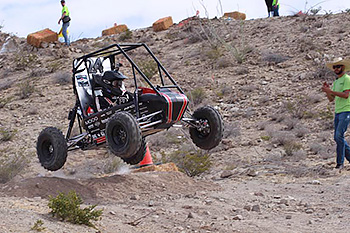
The 2014-15 Cornell Baja SAE Racing Team car; it and the team placed first, second and fourth in three North American Baja SAE events.
Alumni engagement
Alumni engagement is crucial to the success of project teams, says George, and it is evident from Macdonald's endowed position and several successful crowdfunding initiatives.
John Swanson '61 endowed the Swanson Director of Engineering Project Teams as part of a larger commitment to the College of Engineering. His same commitment created the John A. Swanson '61 Engineering Project Teams Endowment.
Although he graduated before FSAE started, David Heller '81 supports Cornell Racing and all project teams in general because he believes they teach teamwork and problem solving -- two critical skills, he says, that are not taught in traditional engineering curricula. He set up an endowment in 2006 for FSAE and a current-use fund to help project teams travel to competitions. He hires project team graduates into his company, Heller Industries in New Jersey, and visits campus to meet with and encourage teams.
"I am blown away each year by students' design sophistication and high level of engineering ability," he says.
Heller, along with former FSAE team members, established the Al George Student Team Award, which recognizes the student project team that has exhibited the highest level of professional engineering skills, attitude and growth each academic year. The award is presented each spring by the Cornell Engineering Alumni Association (CEAA) during its annual awards luncheon on campus. Members of CEAA are in constant communication with project teams, says Kristie Blake, assistant director of alumni affairs for Engineering, and the board awards several team sponsorships each year as well as general program support.
Financial support in amounts large and small poured in to benefit four project teams in 2015 through crowdfunding initiatives: added together, the Cornell Mars Rover project, CUAir, Engineering World Health and Cornell Racing raised more than $61,800 from 240 gifts.
The $27,000 raised to support the Cornell Racing team made a big difference this year, allowing for new research and development projects, which are necessary for both successful companies and successful competitive student teams, says George. He's in the FSAE team garage in Upson Hall, looking at a shiny new engine, which graduate student Torin Gleeson '15 is developing.
"The single-cylinder engine I'm working on is 60 pounds lighter than the current engine," Gleeson says. "The team can switch over to it in the future and have a faster car."
More information: All current Cornell crowdfunding initiatives at a glance: crowdfunding.cornell.edu.